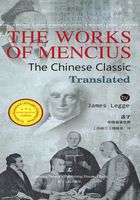
CHAPTER V
1. Mencius said, 'If a ruler give honour to men of talents and virtue and employ the able, so that offices shall all be filled by individuals of distinction and mark;— then all the scholars of the kingdom will be pleased, and wish to stand in his court.
2. 'If, in the market-place of his capital, he levy a ground-rent on the shops but do not tax the goods, or enforce the proper regulations without levying a ground-rent;— then all the traders of the kingdom will be pleased, and wish to store their goods in his market-place.


6. For the ode see the Shih-ching, III. i. Ode I. st. 6.言念, 'to think of'. For the other quotation, see the Shû-ching, IV. v. Sect. II. 3, where we have 逭, 'to escape',for 活, but the meaning is the same.
CHAPTER 5. VARIOUS POINTS OF TRUE ROYAL GOVERNMENT NEGLECTED BY THE PRINCES OF MENCIUS'S TIME, ATTENTION TO WHICH WOULD SURELY CARRY ANY ONE OF THEM TO THE ROYAL THRONE.
1. Compare last chapter, par.2. The wisest among 1000 men is called 俊; the wisest among ten is called 杰. Numbers, however, do not enter into the signification of the terms here. 天下之士云云,—compare Bk. I. Pt. I. vii. 18.
2. 廛, 'a shop, or market-stance', is used here as a verb, 'to levy ground-rent for such a shop'. According to ChûHsi, in the 语类, we are to understand the market-place here as that in the capital, which was built on the plan of the division of the land, after the figure of the character 井. The middle square behind was the 市; the centre one was occupied by the palace;the front one by the ancestral and other temples,government treasuries, arsenals, &c.; and the three squares on each side were occupied by the people. He adds that, when traders became too many, a groundrent was levied; when they were few, it was remitted,and only a surveillance was exercised of the markets by the proper officers. That surveillance extended to the inspection of weights and measures, regulation of the price, &c. See its duties detailed in the Châu-lî,XIV. vii.


3. 'If, at his frontier-passes, there be an inspection of persons, but no taxes charged on goods or otherarticles, then all the travelers of the kingdom will be pleased, and wish to make their tours on his roads.
4. 'If he require that the husbandmen give their mutual aid to cultivate the public field, and exact no other taxes from them;—then all the husbandmen of the kingdom will be pleased, and wish to plough in hisfields.
5. 'If from the occupiers of the shops in his marketplace he do not exact the fine of the individual idler,or of the hamlet's quota of cloth, then all the people of the kingdom will be pleased, and wish to come and be his people.
6. 'If a ruler can truly practise these five things, then the people in the neighbouring kingdoms will look up to him as a parent. From the first birth of mankind till now, never has any one led children to attack their parent, and succeeded in his design.


3. Compare Bk. I. Pt. II. v.3; Pt. I. vii. 18. All critics refer for the illustration of this rule to the account of the duties of the 司开, in the Châu-lî, XV. xi. But from that it would appear that the levying no duties at the passes was only in bad years, and hence some have argued that Mencius's lesson was only for the emergency of the time. To avoid that conclusion, the author of the 四书拓余说 contends that the Châu-lî has been interpolated in the place,—rightly, as it seems to me.
4. The rule of 助而不税 is the same as that of 耕者九一, Bk. I. Pt. II. v. 3.
5. It is acknowledged by commentators that it is only a vague notion which we can obtain of the meaning of this paragraph. Is 廛 to be taken as in the translation, or verbally as in the second paragraph? What was the夫布? And what the 里布? It appears from the Châulî, that there was a fine, exacted from idlers or loafers in the towns, called 夫布, and it is said that the family which did not plant mulberry trees and flax according to the rules, was condemned to pay one hamlet, or twenty-five families', quota of cloth. But 布 may be taken in the sense of money, simply=钱, which is a signification attaching to it. We must leave the passage in Mencius is evidently protesting against some injurious exactions of the time. 氓=民, but the addition of the character亡seems intended to convey the idea of t he people of other States coming to put themselves under a new rule.
6. 信=实, 'truly'.


Thus, such a ruler will not have an enemy in all the kingdom, and he who has no enemy in the kingdom is the minister of Heaven. Never has there been a ruler in such a case who did not attain to the royal dignity.'